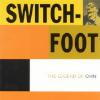| > cMusicWeb.com > Modern Rock > Switchfoot > The Legend of Chin |
|


[ the legend of chin ]
|
|
|||
|
|
|
|
|
|
THEMUSIC
|
|||
|
|
|||
|
|
|||
|
CURRENTS
|
|||
|
|
|||
|
|
|||
|
SEARCH
|
|||
|
|||
|
|
|||
|
cMUSICMAIL
|
|||
|
|||
|
|
|||
THE LEGEND OF CHIN (1997)
 I was a month away from seventeen. All I knew about music was that I didn't like rap or country. I attended more concerts than movies. I owned as many CDs as my friends owned nail polish and shoes. I spent more time rocking out to whatever "seemed cool" than I ever did on the phone. I wasn't your typical teenager, so I got a bit mad when Jon Foreman sang to me, "I don't wanna read the book / I'll watch the movie / 'Cause it's not me / I'm just like everybody else my age" ("Chem 6A"). He was 21. Brother Tim was a mere 18. I didn't stop to think that perhaps Jon was being sarcastic, but I hated singing along to this song, because I did want to read the book. I was unlike everybody else my age.
I was a month away from seventeen. All I knew about music was that I didn't like rap or country. I attended more concerts than movies. I owned as many CDs as my friends owned nail polish and shoes. I spent more time rocking out to whatever "seemed cool" than I ever did on the phone. I wasn't your typical teenager, so I got a bit mad when Jon Foreman sang to me, "I don't wanna read the book / I'll watch the movie / 'Cause it's not me / I'm just like everybody else my age" ("Chem 6A"). He was 21. Brother Tim was a mere 18. I didn't stop to think that perhaps Jon was being sarcastic, but I hated singing along to this song, because I did want to read the book. I was unlike everybody else my age.I also disliked the girl songs. The songs I considered "girl songs" were "The Edge of My Seat" and "Might Have Ben Hur." Once again, I failed to read into the irony. When I heard, "Wonder if she knows / Of the pain I feel tonight," I wanted to smack Jon and tell him to get over it. Sure, I myself asked "And I thought that it might have been her" multiple times (replacing the gender, of course), but I still continually skipped this song for my favorites: "Concrete Girl," "Life And Love And Why," and "You." The flow of these three songs was evidently on purpose, and I savored the flow.
In light of the rest of the album's maturity (and my lack of it), I should have been more forgiving. In light of my musical ignorance, I should have immediately embraced the sound as something beyond typical teenage-boy angst.
Being a budding writer, I embraced the lyrical construction. Lines like "I've seen ashes shine like chrome" ("Home"), "I hope to loose myself for good" ("You"), and "When I lose direction I pray to be found" ("Ode to Chin") became quotable material in my teenage journals, turning my teenage mind to reflect on God in a deeper way, deeper than Sunday School felt-boards.
In listening again, these memories collide with modern-day perception. This is a stellar album. Questions are asked and answered without much pomp. The three-man band sounds sparse, but it's a sparseness that reminds me of clean living spaces. Everything is arranged in its place for a specific design—so the sunlight can dance off one object and send rays dancing through the room like crystal. There's a welcomed simplicity in guitar, bass, drums, and single voice, and in lines like, "I find peace when I'm confused / I find hope when I'm let down / Not in me, but in You" ("You"). There are a few violins spread throughout (What is it that requires rock ballads to include violins? When did that tradition start?), but they aren't overpowering like the majority of songs today.
You and I both know that the success of Switchfoot has surpassed all expectations. And only now, a near decade later, do Christian music elitists acknowledge the gem found in these now five musicians. Even the humble beginning of The Legend of Chin speaks volumes. These songs still feel fresh, and they can still reach a new batch of teenagers navigating the waters of musical taste, personal identity, and religious convictions. If you're reading this and enjoy Switchfoot's music, you cannot remain a bona fide fan until you take this freshman endeavor for a spin.
- Hollie Stewart
May 2005
May 2005
Articles written by the staff.
Maintained by WebMaster Dan Ficker.
Site Design by da Man
All Material © 1999-2005 Different Media LLC
Support cMusicWeb.com